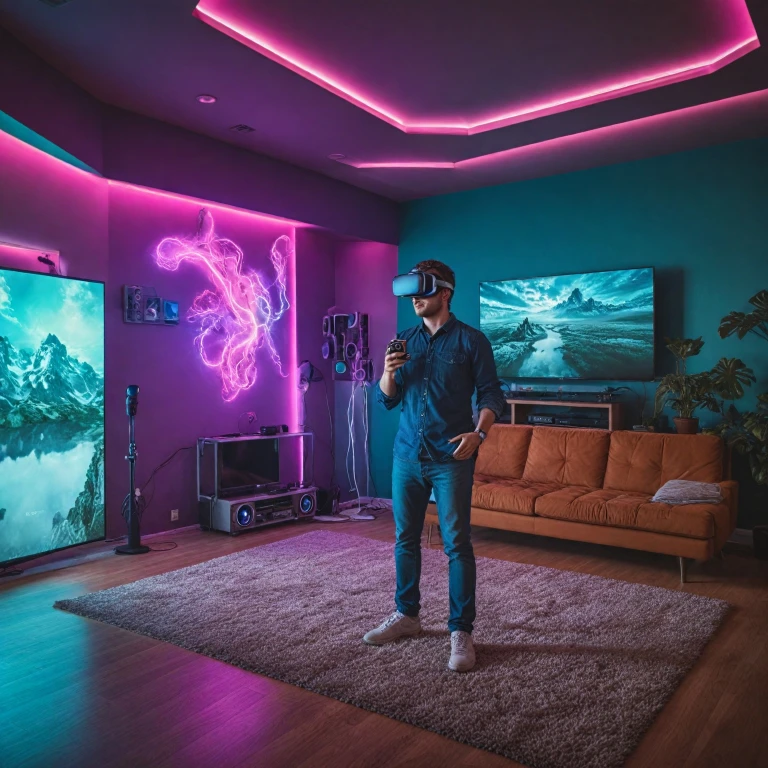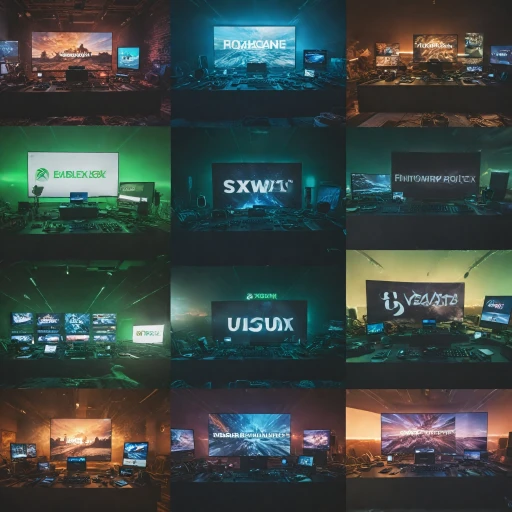
Understanding Virtual Reality in Gaming
The Role of Virtual Reality in Modern Gaming
The term virtual reality (VR) has become synonymous with some of the most immersive and interactive experiences that gaming can offer. Integrating VR into gaming, whether on a console like Xbox or other platforms, has transformed how players engage with virtual environments. Rather than merely playing a game, VR allows users to step inside the game world, providing a level of interaction and realism that traditional gaming cannot match. For Xbox consoles, the concept of VR represents an exciting yet challenging frontier. While competing platforms have ventured boldly into VR realty with their dedicated headsets and compatible games, Microsoft has taken a more cautious approach. Understanding the benefits and limitations of VR starts with exploring its role in the gaming ecosystem. With VR, players can intuitively interact with their surroundings using reality headsets and custom controllers, making each play session a thrilling adventure. Advancements in technology have made VR more accessible. Devices like the Oculus Rift, HTC Vive, and Meta Quest offer diverse experiences in the VR space. These headsets connect seamlessly with gaming platforms, although Xbox consoles have some catching up to do in this realm. However, the gaming landscape is continuously evolving, and Xbox’s potential VR strategies aim to enhance player engagement, comparable to engaging with an iconic gaming icon such as the Halo helmet in a wholly new manner. Current technology allows experiences both exhilarating and deeply engaging for players. This introduction to VR's potential sets the stage for Xbox to explore innovative VR paths while simultaneously gathering insights from other platforms and community feedback on enhancing their offerings.Current State of VR on Xbox Consoles
Exploring the Virtual Reality Landscape on Xbox
In the ever-evolving world of video gaming, Xbox consoles remain a significant player. However, when it comes to virtual reality (VR), the journey has been distinct compared to other gaming devices. With Microsoft's focus primarily directed towards offering top-quality gaming experiences on their Xbox consoles, VR has yet to be fully integrated as seen with other brands like Oculus Rift or HTC Vive.
Currently, Xbox does not offer native support for any specific VR headset. Unlike its competitors, Microsoft has not created a dedicated reality headset for Xbox consoles. This leaves the likes of the Meta Quest and other headsets from brands such as HTC Vive leading the VR gaming experiences through PC and standalone devices. However, interest in the integration of VR gaming continues to grow among Xbox users who are eager for immersive and interactive gaming experiences through Xbox Series consoles.
While Xbox consoles do not yet support VR headsets like those offered by Meta or HTC directly, Microsoft has embraced some VR elements within the ecosystem. Gamers can find several reality-based gaming experiences through services like the Xbox Game Pass. Moreover, the compatibility of some immersive games with custom controllers and Xbox's cloud gaming services provides an interesting perspective on how VR could be experienced differently within this environment.
For avid gaming enthusiasts looking to delve into the realms of virtual reality on their Xbox, understanding the current capabilities of the Xbox VR landscape becomes essential. This sets the stage for future developments and enhancements that may eventually bring VR support more directly into the fold of Xbox's gaming adventures.
Comparing Xbox VR with Other Platforms
Assessing the VR Experience Across Gaming Systems
When it comes to exploring virtual reality options, Xbox consoles stand at an interesting crossroad compared to other platforms. Currently, Microsoft's journey into virtual reality technology, particularly on consoles like the Xbox Series, seems restrained when contrasted with more established VR platforms such as the Oculus Rift and HTC Vive.
While both Oculus and HTC have dedicated headsets and a wide array of VR games and applications, Microsoft's approach has been more cautious. Unlike systems that prioritize immersive experiences with custom controllers and reality headsets, Xbox consoles have focused heavily on wide-ranging gaming experiences through their Game Pass Ultimate offerings and cloud gaming capabilities.
On the other hand, platforms like the Oculus Quest (and its successor, the Meta Quest) deliver an untethered VR experience with a robust selection of titles available directly through its headset. Users on these platforms enjoy a level of immediacy and immersion that's yet to make a prominent appearance on Xbox.
It's also noteworthy that PlayStation has pursued VR with its own dedicated headset, the PS VR, which contributes to a diversifying console market that caters to VR enthusiasts. This emphasis on player immersion and virtual exploration highlights a difference in strategy, as the iconic Halo helmet exemplifies Xbox's rich narrative and visually appealing landscapes.
Without direct VR support, Xbox players may turn to alternative outlets such as Microsoft's expansive game library available on the Xbox app or engage in the online community through platforms like remote play. While hopes remain for a breakthrough in immersive reality solutions directly linked to Xbox consoles, for now, players looking for the best virtual experiences might have to look beyond Microsoft's current console offerings.
Challenges Facing VR Integration on Xbox
Obstacles in Integrating VR into Xbox Platforms
There are several challenges confronting the integration of virtual reality on Xbox consoles. Firstly, one of the primary concerns is hardware compatibility. Unlike Microsoft's competitor consoles, the Xbox line has yet to introduce a dedicated VR headset. This limits players who are looking for a fully immersive gaming experience that virtual reality offers. Although Xbox consoles like the Xbox Series X and Series S boast impressive specifications, they must effectively incorporate VR technology through specialized headsets or peripherals.
Another significant challenge is software optimization. Developers creating virtual reality games and experiences need to ensure that their content seamlessly runs on Xbox devices. With Microsoft promoting features like the Game Pass Ultimate and cloud gaming, there is potential to deliver a more dynamic VR experience. However, syncing this with VR technology remains a technical hurdle.
Additionally, price and accessibility play crucial roles in broader VR adoption on Xbox consoles. The cost of VR hardware, such as high-quality headsets, remains a consideration for consumers who seek to enhance their gaming experiences. The success of VR on Xbox would likely benefit from a diverse selection of games that leverage this technology while still being economically accessible.
Another aspect to consider is market competition. VR platforms like Meta Quest and Oculus Rift have cultivated substantial user bases. Xbox must compete with these established players to distinguish its offerings and attract both gamers and developers willing to invest in its ecosystem. Creating custom controllers and seamless user experiences on Xbox consoles could play a vital role in overcoming these competitive challenges.
While the path to full VR integration on Xbox is not without its challenges, the potential for innovation and audience engagement remains significant. Microsoft's path forward will likely involve strategic developments and collaborations within the gaming community to bolster support for VR technology on their platforms.
Potential Future Developments for Xbox VR
Anticipating the Evolution of VR on Xbox Consoles
Integrating virtual reality into Xbox consoles has been a topic of interest for gamers and developers alike. Microsoft has yet to launch a dedicated VR headset specifically for Xbox consoles, unlike competitors such as Meta with its Quest headsets or the Oculus Rift that are supported on other platforms. However, the growing focus on cross-platform functionality hints at potential future developments. One potential direction is enhancing compatibility with existing VR headsets. Xbox Series consoles possess the computational power necessary to support immersive VR experiences. Leveraging cloud gaming capabilities could also provide opportunities to deliver high-quality, latency-free VR content through Xbox Game Pass Ultimate. This powerful combination could redefine gaming experiences by integrating AR (augmented reality) elements into traditional Xbox games. Microsoft's pursuit in cloud gaming and creating a comprehensive gaming ecosystem could eventually lead to innovations in VR integration. Developers and the gaming community expect a future where game streaming services and VR coexist seamlessly. Remote play may also become more versatile, allowing players to engage in virtual reality gaming through devices not directly connected to the Xbox console. To achieve this prospective integration, significant strides in software development and partnerships with existing VR companies like HTC Vive may rise. This would ensure that any VR solutions are feasible and user-friendly, catering to a broader audience demographic who own Xbox consoles. A forward-thinking approach prioritizing ease of use, quality, and variety in Xbox games would set a crucial milestone, positioning Microsoft favorably in the evolving virtual reality gaming sphere. As the landscape evolves, these aspirations and strategic steps could pave the way for all-new experiences for Xbox fans who seek immersive gaming adventures.Community and Developer Perspectives on Xbox VR
Community Insights and Developer Feedback
The community and developers have been vocal about their expectations and experiences regarding virtual reality on Xbox consoles. Many gamers are eager to see how Xbox will expand its offerings in this area, especially considering the popularity of devices like the Oculus Rift and Meta Quest. The potential for immersive gaming experiences on Xbox Series consoles is a topic of frequent discussion among gaming enthusiasts.
Developers, on the other hand, face unique challenges when creating VR games for Xbox. The integration of VR technology with existing Xbox hardware, like the Xbox controller and custom controllers, requires careful consideration to ensure a seamless gaming experience. Moreover, developers are keen on leveraging the Microsoft Store and Xbox Game Pass to reach a wider audience.
Community Engagement and Feedback
Engagement within the Xbox community is high, with forums and social media platforms buzzing with suggestions and critiques. Gamers are particularly interested in how Xbox VR can compete with other platforms, such as HTC Vive and Meta's headsets. The community is also curious about how Xbox's cloud gaming and remote play features might enhance VR experiences.
Overall, both the community and developers are optimistic yet cautious. They recognize the potential for Xbox to deliver some of the best VR experiences, provided Microsoft addresses current challenges and continues to innovate. As discussions continue, the hope is that future developments will align with the community's expectations, making VR gaming on Xbox consoles a truly immersive reality.













